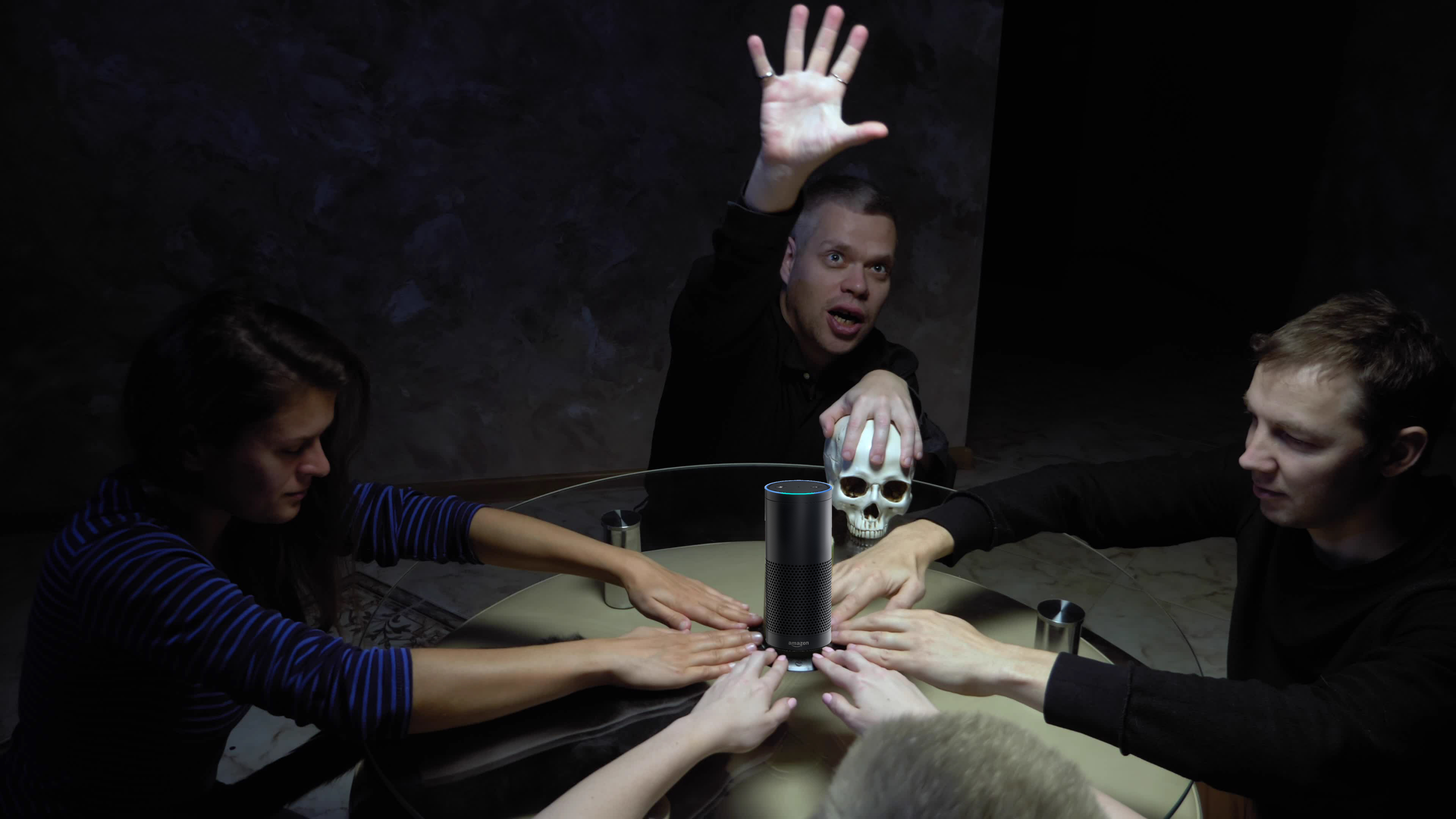
It wasn’t that long ago when technologists were convinced voice would replace standard search anytime soon. Some predicted 80% of our searches would be via voice by 2030. And while it’s true more and more people are comfortable talking to their cars, their TV remote controls, and their phones, growth in smart speakers as standalone gadgets has plateaued.
I blogged about this phenomenon when Techsurvey 2022 came in from the field earlier this year. Last year, smart speaker growth started to slow down. This year, it appears to have stalled out. While current owners continue to add extra devices around the house or in other locations, Amazon and Google are having trouble attracting new adopters to bring one of these devices into their lives.
The culprit? Publicity that captivated the pubic, but that Amazon failed to aggressively counter. Over the years, anti-Alexa news stories have taken root – like urban legends. They are now very hard to “undo.”
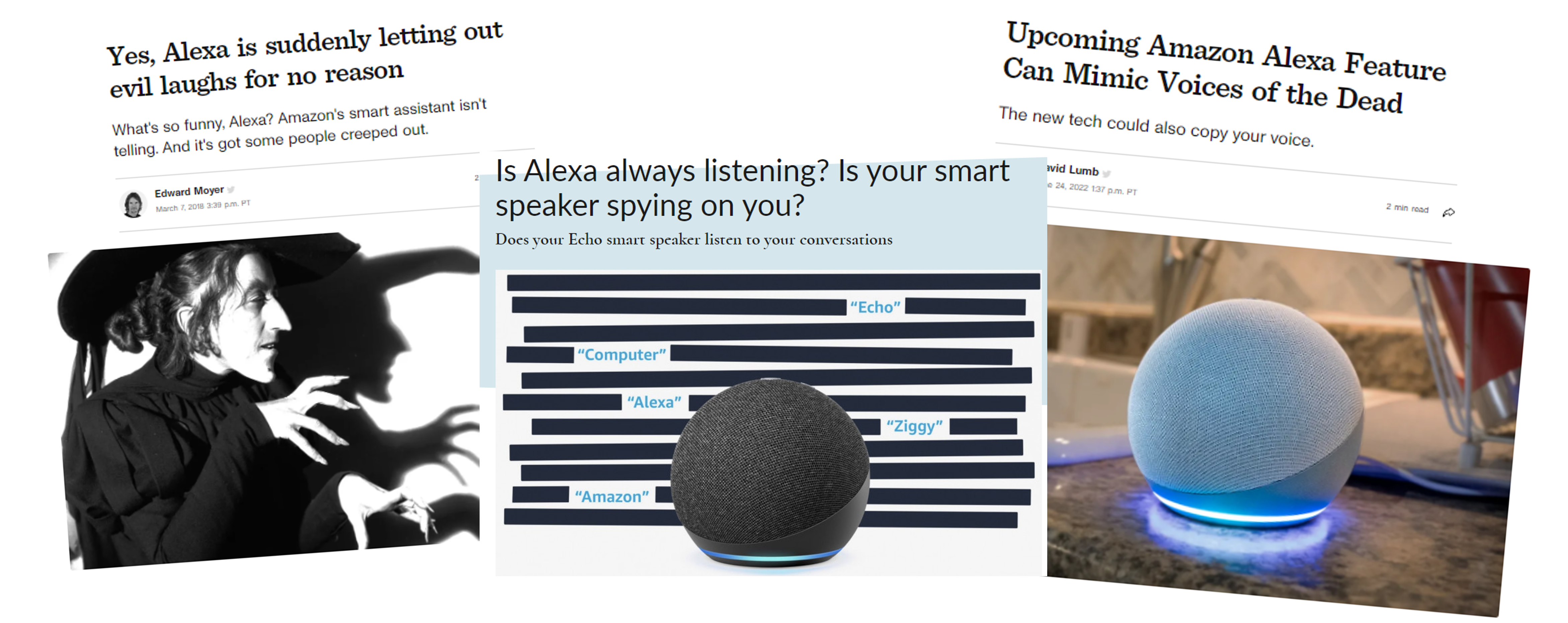
In countless focus groups, I ask those who haven’t taken the plunge to explain why they haven’t purchased a smart speaker, the explanation is usually the same:
“I don’t want to bring a device into my home that listens to me and my family.”
While it’s true that either an Alexa or Google Home does, in fact, listen to the world around it, so do myriad other devices in our lives – our cars, our phones, and our TV – we somehow don’t give that a second thought.
When Amazon first brought Alexa to market in 2014, the scary headlines began to crop up almost immediately. It was like an Amazon conspiracy theory: evil billionaire Jeff Bezos was plotting to place these listening devices in our homes to eavesdrop on our conversations.
And many people believed it. We regularly talked about smart speakers in focus groups for both public and commercial stations. The pushback was always the same. The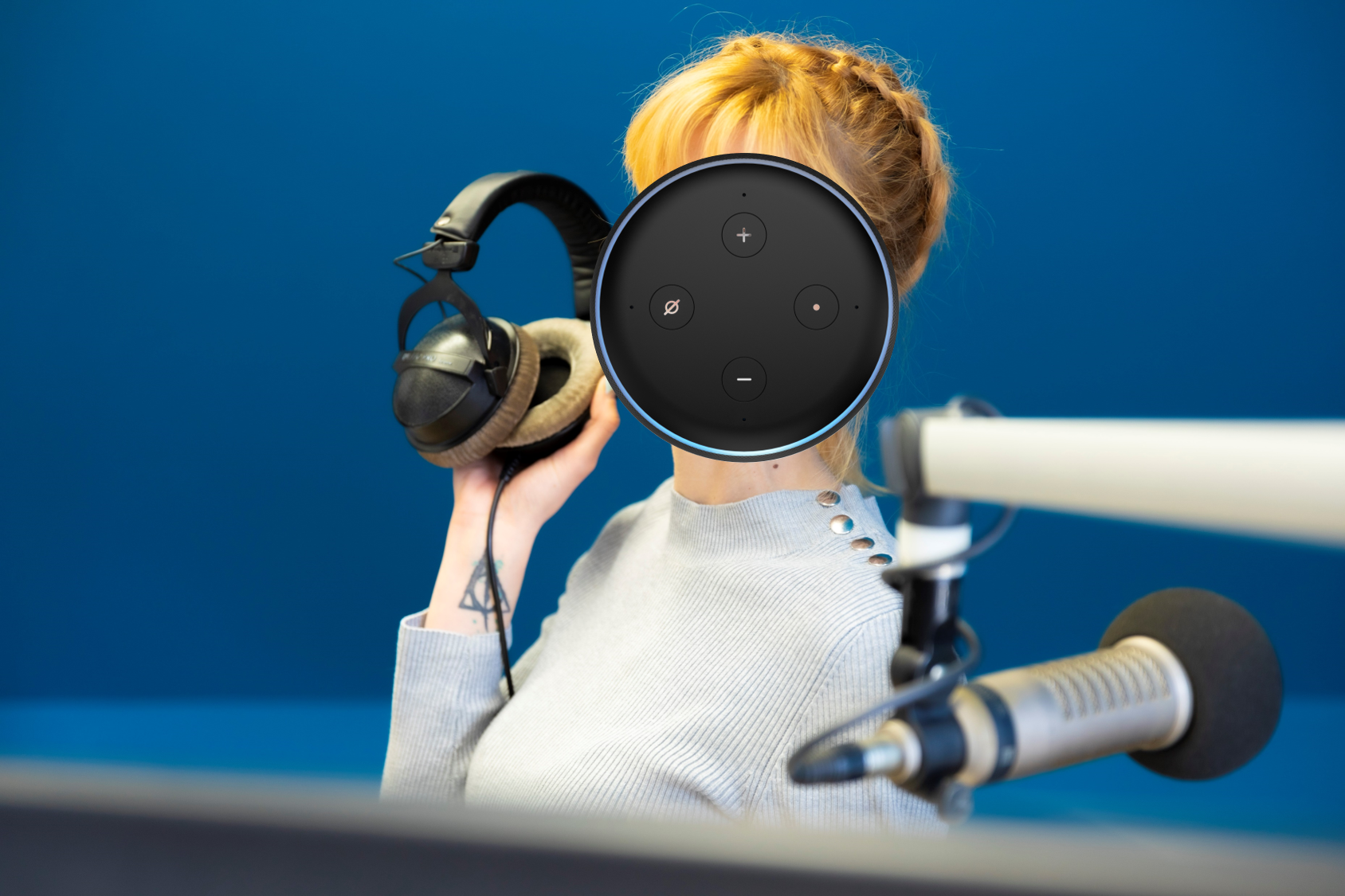 downside of the Amazon device given a person’s name was clear in negative remarks:
downside of the Amazon device given a person’s name was clear in negative remarks:
“I don’t want her listening to my conversations.”
I remember an Echo owner in a focus group who told me she would never place a smart speaker in her bedroom – for privacy concerns. She didn’t want Alexa to overhear her boudoir activities. Big Sister is listening.
And now eight years later, I ran across a morning show earlier this week advising listeners to put Alexa in the microwave (not “on”) when you’re having a conversation you’d prefer to remain private. (Just don’t hit “defrost.”)
Somehow in just a short time, Alexa became the consumer version of H.A.L., the sinister computer that sabotages the space probe in “2001: A Space Odyssey.” Once the astronauts realize H.A.L. has run amok, they go to great lengths to converse without “him” overhearing them. In fact, a bunch of bored Alexa users produced this brilliant parody back in 2018:
It’s hilarious, all right. But it reinforces voice recognition technology has a long way to go, and may not be worth the investment.
The smart speaker adoption stall-out has become exacerbated as privacy concerns have become front-burner issues for millions of us. High-level hacks, cyber attacks on social media, and web-tracking by the biggest tech companies have only become more top-of-mind in recent years. We fear big companies and how they’re using “our data.” And Amazon is one of them.
Big tech has increasingly earned our distrust and our disdain. Since Alexa’s debut, Mark Zuckerberg, Sundar Pichai, Tim Cook, and yes, Jeff Bezos have all been dragged in front of stupefied Congressmen, trying to grapple with the impact of companies that have a higher market cap than the GDPs of all the countries in the EU. Now, nearly half our Techsurvey respondents believe certain tech giants should, in fact, be broken up, an opinion that has solidified since COVID:

Why didn’t Amazon take steps to address this bad publicity (and misinformation) from the git-go? When you’re introducing a new technology to the masses – especially one that is extremely affordable – you want it to become as ubiquitous as possible.
In the early days of Alexa and the Google Home, there were enough early adopters to produce what I referred to as “iPhone growth.” Out of the gate, millions were buying smart speakers, and Alexa was well along the path of overshadowing Siri, Apple’s incumbent voice assistant. Alexa was the new girl on the block, and by giving her an identity, Amazon leapt ahead of Google here in the States, a lead she has yet to relinquish.
But after a couple years of rampant growth, we started seeing signs of a slowdown in 2020, unrelated to COVID. And now smart speaker growth as all but stopped, leaving Amazon (and to some extent, Google) at a crossroads.
Interestingly, “voice” as a means to seamlessly learning, discovering, and getting what we want without lifting a finger is becoming more popular with each passing year as more devices become proficient at interpreting our vocal commands. But smart speakers? Who needs ’em?
As voice became more popular, Alexa herself did not. And the failure to counter those initial privacy concerns became even more pronounced when the next story to go viral made every news show, website, and of course, morning show. “Laughing Alexa” became the next debacle for Amazon.
That negative wave was short-lived, but influential in reinforcing the dangers of smart speaker technology. It started in 2018, and once again went viral. The story was that for no reason, Alexa devices would simply start eerily laughing. Amazon quickly admitted the quirk, and reported they were working on a solution. Apparently, certain commands were mistakenly translated as “Alexa, laugh,” and the voice-recognition software responded with a creepy cackle.
But by then, the damage was done. The CNET headline above says it all, especially the part about consumers getting “creeped out.” People posted videos on social media, and of course, late night TV couldn’t resist:
Last week, it happened again. And this time, the wound was totally self-inflicted. CNET reports that at Amazon’s re:MARS conference, the company announced that after monitoring someone’s voice for under :60, Alexa can simulate it.
Amazon suggested a possible use for this upcoming feature might be to use the voice of a friend or family member who had passed away to “make memories last.”
Rather than promote Alexa might mimic James Earl Jones or Kim Kardashian, technologists went right for dead people, conjuring up thoughts of cyber-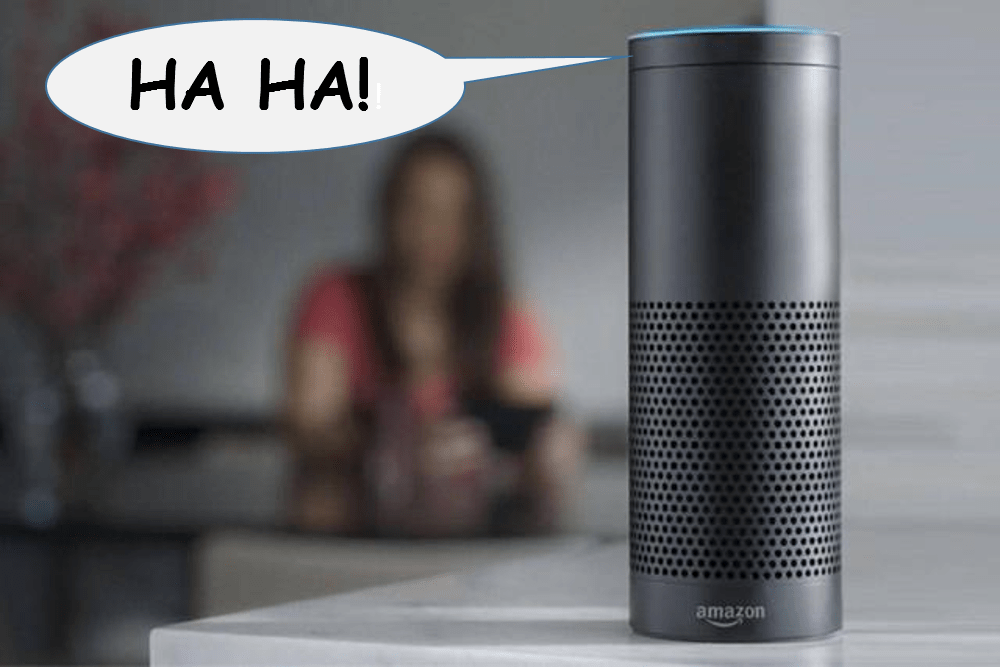 séances, bringing voices back from the afterworld.
séances, bringing voices back from the afterworld.
Really? Where are the marketing people? Is Amazon that siloed that these obvious snafus are simply allowed to happen?
Of course after the fact, an “Amazon spokesperson” walked back this screw-up, reassuring CNET that the technology is more about producing high-quality voices with less and less data than it is mimicking the dearly departed.
But by then, the damage was once again done. Alexa once again made headlines….for her inappropriateness. Now there are even more reasons not to bring creepy Alexa into your home. She’s a spy, she’s a maniac, and she’s a techno-medium.
Why does any of this matter to radio broadcasters?
Because a key use case for smart speakers is listening to AM/FM radio stations – especially in our environment where “regular radios” are disappearing from people’s homes.
Techsurvey 2022 confirms nearly one-fifth of smart speaker owners say they now listen to more broadcast radio since acquiring the device. (That’s a net positive of +9% factoring in those listening less.)
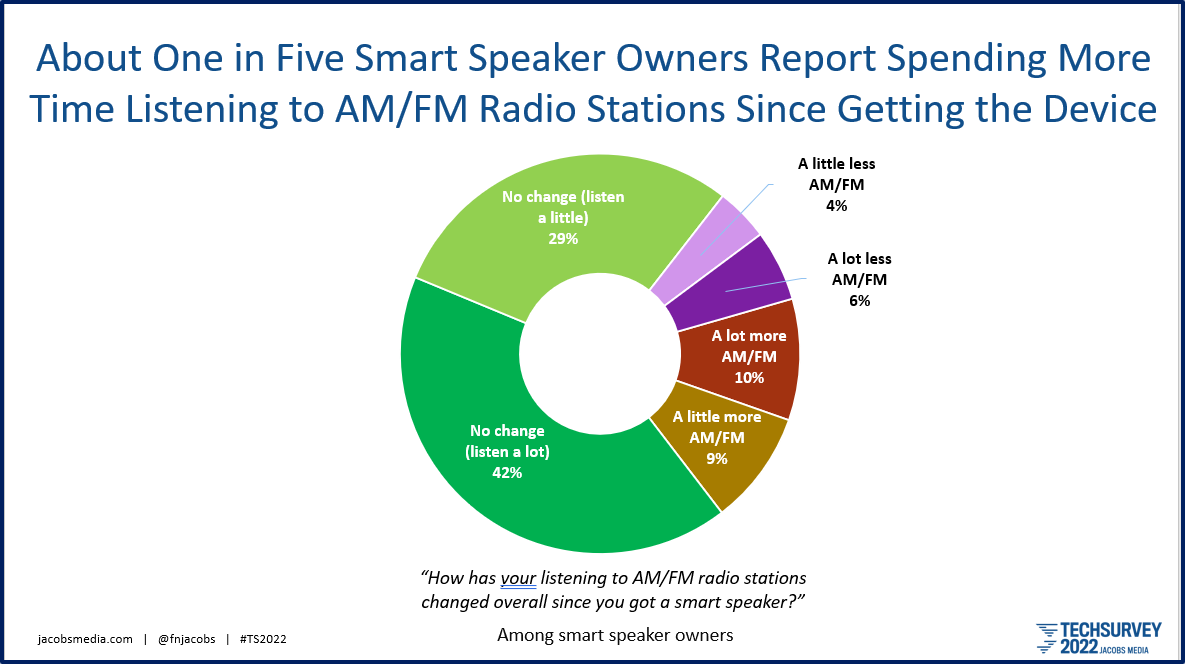
We learned during the COVID outbreak how smart speakers could be not only additive to radio listening, but provide a way consumers can seamlessly tune in – by simply asking Alexa to find your station and your content.
None of this is about Amazon’s fate or fortunes. They’ll be a juggernaut whether their smart speaker business regains its footing or not. It is all about Alexa optimizing its potential to still dominate voice in the car, at home, and at work. It is about smart speakers replacing those old clock radios, boom boxes, and stereos that once proliferated in homes.
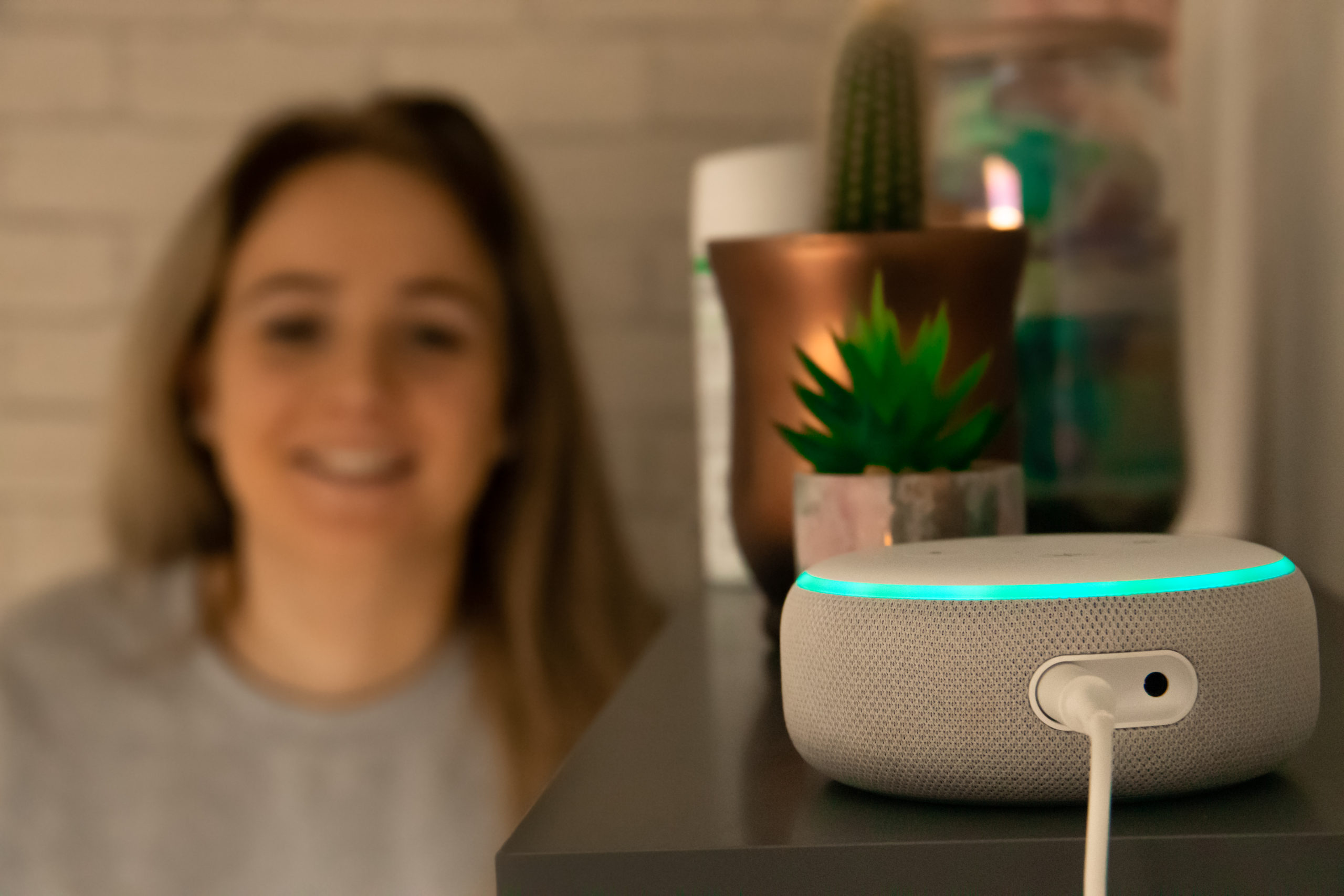 Some might argue that smartphones have filled that gap, and thanks to apps, millions stream their favorite radio stations on these portable devices. But smartphones tend to be personal, while smart speakers are communal. The latter features better speakers and are more conducive to group listening. For all these reasons, it is in radio’s best interests for Amazon to regain control of its Alexa marketing, and overcome the negatives it has allowed to form and fester.
Some might argue that smartphones have filled that gap, and thanks to apps, millions stream their favorite radio stations on these portable devices. But smartphones tend to be personal, while smart speakers are communal. The latter features better speakers and are more conducive to group listening. For all these reasons, it is in radio’s best interests for Amazon to regain control of its Alexa marketing, and overcome the negatives it has allowed to form and fester.
Listening to radio on Alexa devices is a more important application for the world’s most famous voice assistant than spying, laughing, or performing vocal resurrections. It is something she does very well.
If Amazon’s messaging got back on-track, it could be the best thing to happen to AM and FM stations since the clock radio.
“Alexa, can you save radio?”
- Media And Technology In 2025: Believe It Or Not! - April 18, 2025
- In Radio, You Just Never Know - April 17, 2025
- The Secret To Making A Great Podcast (And Great Radio) - April 16, 2025




I have points in agreement with yours, Fred, and also some differences. I use smart speakers in my homes for the exact purpose you describe: to hear stations I like in rooms that don’t have an actual radio in them, or when I want to hear a station that isn’t in range. I use them for little else.
However, I just got back from a trip to Washington state on family matters and spent some time with my nephew in the Seattle area. He’s in his 30s, is a mid-level executive with one of the tech biggies, and is very tech-savvy. While spending the weekend with him and his family as a guest in their home, I heard his wife “talking with” Alexa for various mundane purposes (eg, timing something in the oven)–but no radio.
Curious about this very topic (radio’s future), I broached it with my nephew because I’d heard the radio playing in his car while we drove somewhere. He said candidly that he tunes the radio because it’s easy to do so–and easy to scan to a different station when the ads start; he sees having to hear adverts as radio’s principal defect. At home is different: I asked whether he had an actual radio anywhere in the house, and he said he doesn’t, other than the tuner that his AV receiver naturally contains. Later, I turned that receiver on and tried to listen to a local station. Silence–he hadn’t even connected an antenna, even though he receives OTA television and obviously could have.
So, yeah, plug those smart speakers, as NPR does numerous times every hour; but don’t make the mistake of thinking they’re the solution to all radio’s problems.
John, you are correct. Smart speakers are a convenient distribution solution, but they don’t make up for content shortcomings or lousy experiences. Sadly, that’s not an easy lift.
As radios disappear from homes (or aren’t even turned on!), smart speakers can help, but they aren’t “the answer.”
I could be wrong. Wouldn’t be the first time. But for my part — It’s misuse of pirated personal information. Tracking. Total abuse of privacy. How many times have you or someone you know done a search for metric sockets, desktop computer deals, incontinence underwear or rocket powered grenades, and had the robots of Google and Amazon following them around with related popups and other messages for days or weeks after that? I worry that the big tech companies can “message” all they want, but they don’t care about the people they are using and abusing for marketing and advertising. The people are catching on. It’s a rock and a hard spot dilemma. We want to count on the smart speakers to serve audience, but the tech companies are too willing to stoop as low as they want to scraping every molecule of our private lives that they can. Is the cat out of the bag? Can we stuff the genie back in the bottle?
Lalo, we cannot. The tech companies are out of control, and the politicians don’t know enough but how things work (not to mention their inability to do pretty much ANYTHING) to regain any semblance of control, much less sanity.
As I say to our radio clients all the time, be thankful new audio content opportunities and outlets are at least available – mobile phones/apps, smart speakers, podcasts. If we cannot wrestle these new tools, we deserve whatever fate befalls us.
Thanks for commenting.